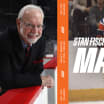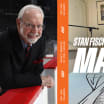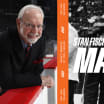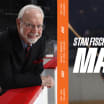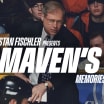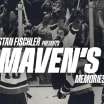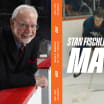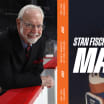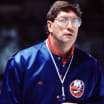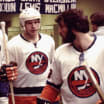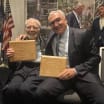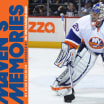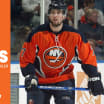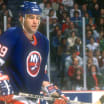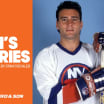Tampere, Finland is famous for a lot of things, not the least of which is a rich history and picturesque river that flows through the city's center.
But as far as Islanders history is concerned, Tampere is most famous for Bill Torrey's Finnish import -- Mikko Makela.
Maven's Memories: Mikko Makela, The Flying Finn
Stan Fischler profiles the Flying Finn, Mikko Makela
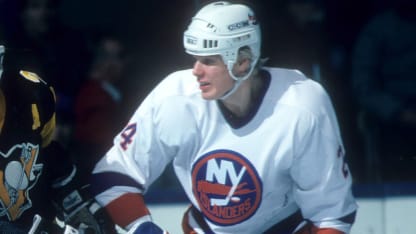
© Bruce Bennett/Getty Images
By
Stan Fischler
Special to NHL.com
Coliseum fans remember him as a skilled, smart, solid forward who teamed with the likes of Hall of Famers Bryan Trottier and Pat LaFontaine.
"Playing alongside a couple of Hall of Famers like Trots and Patty was part of what made my experience with the Islanders so special," said Makela.
The Flying Finn arrived at Hempstead Turnpike in September 1985 with the four-Stanley Cup dynasty vivid in the rearview mirror.
"It was a tough act to followed," Mikko allowed, "but I did my best and we had some good times."
While Makela didn't win the rookie-of-the-year award, he was a solid freshman over 58 games. He totaled 16-20-36 and all signs indicated that the best was yet to come; and it was.
"It was rebuilding time," said Torrey. "We already had success with Swedish players like Stefan Persson, Anders Kallur and Tommy Jonsson. Now it was time to try our luck with Finns."
Mikko needed little adjustment from big-rink European hockey to the more compact NHL ice patches. He snugly fit in with the team although Makela wasn't about to make any All-Star teams. At least not yet.
MAVEN'S MEMORIES
WRITTEN COVERAGE
Stan's 17 Birthday Memories
Jason Blake Played Big
Shirley Fischler Breaks Gender Barriers
Jim Devellano, The Other Architect
The 2003-04 Season
Mike Bossy's Road to the Islanders
The 2002-03 Homestretch
John Tonelli Five-Goal Game
Isles vs Leafs in 2002
The Amazing 2001-02 Season
Explosive Trades Launch 01-02
Maven's Haven
But the blond blaster did make a good impression. On January 28, 1986, he enjoyed his first breakout scoring bonanza -- two goals and three assists -- in a 9-2 win against Toronto.
"Let's not forget that injuries plagued him in his rookie season," recalled Islanders and MSG Networks stat ace Eric Hornick. "Still, his five-point game placed him alongside such Hall of Famers as Bryan Trottier, Mike Bossy and Pat LaFontaine."
By that time the Islanders faithful had come to appreciate the rookie and the feeling was mutual. Mikko does, however, admit that acclimatizing to North American life was a bit of a challenge.
"In Tampere," he recalled, "Long Island was viewed as so very far away. I really didn't know much about it except what I might have picked up in the newspapers or on television. Who knew from Uniondale?
"When I got to the Island I had to go through a huge adjustment; not only in the hockey end but life away from the rink. I had to learn a language completely different from my own. But with help, I was able to do it."
During that long-ago-and-faraway-no-cell-phones era, he couldn't easily communicate with his parents and friends in Tampere. At the start, it was easy to get lonesome even with friendly teammates to help.
"A phone call to Finland at that time was costly," he remembered. "A 15-minute conversation was around $100. There was no such thing as FaceTime calls. I spoke to my parents once a month."
Any homesickness eventually evaporated and he became one of the boys. He revealed that he especially bonded with Pat LaFontaine who lived nearby. Then, there were the hometown rooters to buoy his spirits.
Makela: "I was very fond of the fans because they were so passionate; so special and honest. When I wasn't playing my best, they let me know it and when I was on my game they were with me all the way."
Mikko enjoyed one advantage when it came to fickle fans; his sportsman father had told him personal stories related to the athletic fields of battle.
"My dad clued me in to what major league sports were all about," Mikko said. "He could relate to it because he was a professional soccer player back home. In fact, he was inducted into the Finnish Soccer Hall of Fame."
Once Mikko had become an adopted Long Islander as well as a full-time member of the team, his game grew. It didn't hurt that Coach Al Arbour placed him on a line with Bryan Trottier and Greg Gilbert
"Playing alongside Trots was a dream come true," he chuckled, "Bryan not only was a great player but also a great person. Gibby complemented our line very well.
"The thing with Trots was that he gave me confidence that I didn't have before. Bryan was so good that the opposition sometimes needed three guys to watch him. That gave me a lot more room to do my thing."
Compliments from Arbour depended in large part on how well Makela learned the Radar way of doing things. He told me that he'll never forget the one time he crossed Radar's Red Line. It wasn't funny either.
Take it away, Mikko:
"It was February 1986 and I had been in every practice and optional practice throughout my rookie season. On this particular day we had an optional practice.
"Since the coach said 'optional,' I figured that I could use one day off from hockey to relax. I decided to skip the scrimmage and treat myself to a matinee movie and then a nice dinner.
"I thought I deserved it but I was WRONG! So, the next morning I came to practice and, suddenly, the first thing I saw was Radar walking toward me and he didn't look too happy.
"As a matter of fact he had a mean look.in his eyes; and I found out why. He came up to about an inch away from my face and let me know with his deep voice that it was not an optional practice for me.
"After that dressing down, I had to clean my face with a paper towel. I learned that I wasn't going to miss an optional practice any more. And I never did."
Mikko also played under coach Terry Simpson and played in the marathon Easter Epic, April 18, 1987 at Capitol Centre in Landover, Maryland. Simpson, who had succeeded Arbour, was behind the bench for that one.
The game was so long that it carried over from Saturday night and into early the next morning which happened to be Easter Sunday.
"For sure," said Makela, "it's the game I'll never forget. How could I? It went four overtimes before Patty (LaFontaine) beat Bob Mason in the Washington net. They tell me that it took a full six hours and 16 minutes to play.
"This was the only Game Seven in that first round and, thinking about it, I often wondered how we ever won it; but the answer had to be Kelly Hrudey's goaltending."
Hrudey made 73 saves compared to Mason's 54 and each time, the Isles had to rebound from a deficit. Washington was up 1-0 at the end of the opening frame and 2-1 after the second.
"There was less than six minutes left in the third period when Trots beat Mason to tie it. After that, both goalies were unbeatable. It was exciting and what a lesson for young guys like me."
Mikko learned a few more lessons from that match and that was the "Never Give Up" quality of the Nassaumen. Call it Islanders tradition, if you will, but it was evident in the end.
Makela: "We were down three games to one in that series but we knew that the Islanders had a history of coming back and that gave us confidence. Sure enough, we won the next two and tied the series.
"The other thing that was so amazing about the game was its pace. Even -- as tired as some of the guys may have been -- both teams were skating full speed ahead -- and then we'd return to the bench, exhausted."
Makela now calls Lethbridge, Alberta his home. He scouts for the Columbus Blue Jackets, headed by fellow Finn, Jarmo Kekalainen. When I reached him for this story, Mikko was in British Columbia, checking on Junior teams.
When not on the road, he's home with his wife, Janice, daughter Sophia and two pet dogs, Tati and Frankie. The family got accustomed to the Canadian west years earlier.
Previous to his Columbus gig, Mikko coached the WHL's Lethbridge Hurricanes from the 2002-2003 season through 2003-2004. Among his products were eventual Chicago Blackhawks Cup-winners, defenseman Brent Seabrook and forward Kris Versteeg.
He's proud to say that his Islanders experience was special from every angle; especially the friends he made.
"Patty (LaFontaine) was one of my closest buddies. We lived very close to each other and often would try to see which one of us would get home first from practice. When you're young -- as we were then -- you tend to do silly things like that."
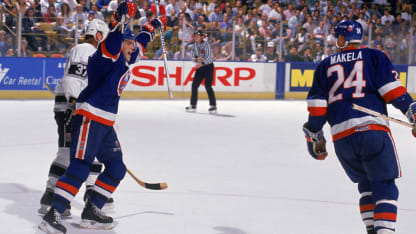
© Mike Powell/Getty Images
The man who drafted Mikko, Bill Torrey, left a lasting impression on the young player as well.
Makela: "Bill was a gentleman and a very honest man. I had a lot of respect for him. But I'll tell you this; one thing a guy like me didn't want was to be called into his office.
"He was impressive, especially when he was sitting behind his desk. Bill had it arranged it so that his chair was higher than any of the others. I can assure you that when I was called in, I felt pretty small sitting there."
Mikko's most productive season was the 1987-88 campaign when the Isles finished first in the division. On March 31, 1988 he enjoyed a four-point game with a goal and three assists, beating Washington, 7-3.
Like many other professionals who've followed Makela's career, stat king Hornick recalls Mikko with appreciation for his body of work with the Nassaumen.
"To this day," Hornick noted, "Mikko remains the Finn who has had the most success as an Islander."
He finished the season with 36 goals and 40 assists for 76 points over 73 games. By that time he'd become a fan favorite and the vice was versa.
"That particular Islander team was unbelievable in every way," he insisted. "There was tons of character in the room and that helped young guys like me improve our games. To this day I'm forever grateful to have been on that team."
Although he was traded to Los Angeles for Hubie McDonough and Ken Baumgartner during the 1989-90 season. Mikko looks back on his days in Nassau with considerable affection.
"For one thing," he concluded, "there was no better place for a young player to learn accountability than on the Island. One of the things I especially worked on was improving the defensive side of my game and backchecking.
"I was proud to play for such an important franchise and with a bunch of great guys. All in all, the Island was a special place for me -- and always will be!"

